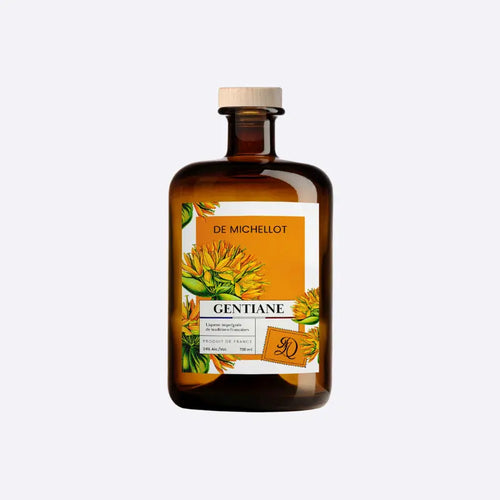Distillation and Production of Michellot Liqueurs
The Fascinating World of Liqueurs
Liqueur making is a subtle art that relies on ancestral know-how and a rigorous selection of ingredients. At De Michellot , we favor an artisanal approach that respects traditions, emphasizing authenticity and rich flavors.
Discover our production method, wheremaceration is king , and how certain limited edition liqueurs benefit from a unique distillation or barrel aging.
Maceration: A Gentle Extraction of Aromas
The majority of De Michellot liqueurs are made by maceration , a natural process which gently extracts the aromas of plants, fruits and spices.
📌How does maceration work?
-
Selection of ingredients : exceptional plants, herbs and citrus fruits.
-
Infusion in alcohol : slow extraction of aromas over several weeks.
-
Filtration and refining : meticulous work to preserve the purity and intensity of the flavors.
-
Adding sugar (if necessary): subtle balancing for perfect taste harmony.
🍃Examples of liqueurs by maceration:
-
Gentian Liqueur : gentian root infused for controlled bitterness.
-
Verbena Liqueur : infusion of verbena leaves for a lemony freshness.
-
Génépi Liqueur : extraction of genepi aromas for a floral and herbaceous touch.
Distillation: An Exception for Mint
Of all our liqueurs, only theMint Liqueur uses distillation to enhance its aromas.
🔥Why distill mint?
-
Distillation allowsthe essential oils of mint to be extracted with absolute purity.
-
It gives aunique aromatic intensity , without excessive bitterness.
-
The result is a fresh, powerful and perfectly balanced liqueur.
Limited Editions: Aging and Experiments
De Michellot also explores innovative techniques , notably with limited editions which benefit from special refining.
🛢️Génépi aged in rum barrels
-
After traditional maceration, this liqueur is refined inrum barrels , giving it unique woody and vanilla notes.
-
This aging brings anexceptionalroundness and aromatic complexity .
🔬Future experiments
We continue to explore new methods: aging in oak barrels, long macerations, unique blends... De Michellot innovates while remaining faithful to its heritage.
Conclusion
At De Michellot , liqueur production is based on an authentic and artisanal approach , where maceration is at the heart of the process. Only certain liqueurs, such as Menthe , are distilled, while our limited editions explore unique aging processes.
Discover our collection and immerse yourself in the world of exceptional French liqueurs.
What Are Liqueurs?
Liqueurs are alcoholic beverages that have been infused with flavors from fruits, herbs, spices, or nuts. Because they often contain sugar, liqueurs tend to be sweet and smooth, making them perfect for sipping after dinner. However, not all liqueurs are created equal, as their production methods vary widely depending on the region and tradition. So understanding how these drinks are made can enhance your appreciation for them.
The Process of Making Liqueurs
Creating liqueurs involves several steps, including fermentation, distillation, infusion, and aging. For example, during distillation, alcohol is separated from water by heating it until it evaporates. But this step alone doesn't create the rich taste we associate with liqueurs; infusing botanicals into the spirit adds complexity. This means producers must carefully select ingredients to achieve the desired flavor profile.
History and Popularity of Liqueurs
Liqueurs have a long history dating back centuries, originating in Europe where monks first experimented with herbal infusions. Because of their medicinal uses at the time, they became popular among royalty and nobility. Today, liqueurs remain beloved because of their versatility—they can be enjoyed straight, mixed in cocktails, or even used in cooking. So whether you're a fan of classic recipes or modern twists, there’s always something new to discover in the world of liqueurs.
